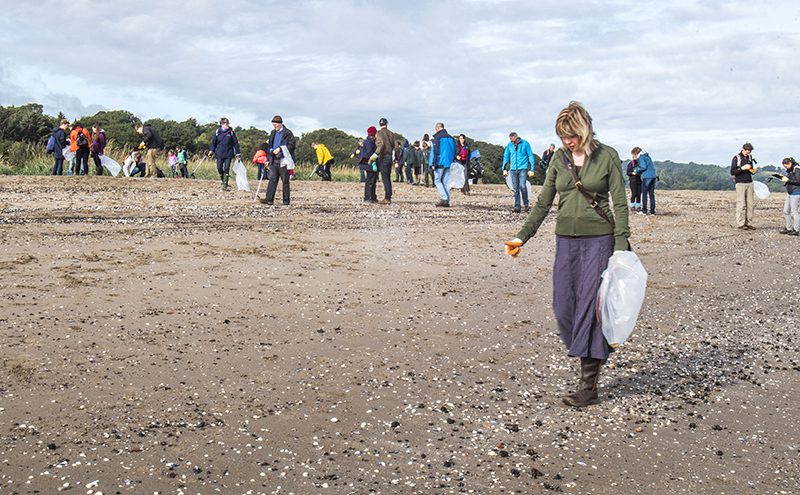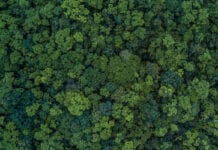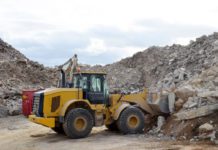
There’s more litter on Scottish beaches than last year with cotton bud sticks at their highest level for eight years
The Marine Conservation Society (MCS) says its Great British Beach Clean was the biggest mass participation beach clean and survey event Scotland has ever witnessed. The charity says the event, held over four days in September, involved just over 2,900 volunteers – almost double the number in 2017.
The Great British Beach Clean, which took place 14th -17th September 2018, saw volunteers remove 2,503kg of litter from Scottish beaches. In total, 75,807 litter items were picked up along the 15,680 metres of surveyed coastline.
The biggest turnout was at Cramond near Edinburgh where 173 volunteers cleaned up two stretches of the beach. At Ayr, South Ayrshire, 146 people helped clean up the beach, whilst 130 volunteers joined in at Wardie Bay, Edinburgh and 100 cleaned and surveyed at Inverkip Harbourside, Inverclyde.
Catherine Gemmell, MCS Scotland Conservation Officer, says the support from volunteers in Scotland was overwhelming and highlights a monumental turn in the tide on awareness of beach litter: “I am always in awe of the incredible people who give up their precious time to help us clean and gather important data on our beaches. This year left me speechless, but not our volunteers! They tweeted, shared, instagrammed, talked, cleaned and surveyed to such an extent that our social media feeds were and still are filled with their work. Finally, beach cleaning is mainstream and at MCS we couldn’t be happier – it’s what we’ve been working towards over the last 25 years. We’re also grateful to playes of People’s Postcoe Lottery whose support makes this event go from strength to strength each year.”
In Scotland, the average number of items recorded per 100m cleaned and surveyed was 559 which, although lower than the UK average of 600, is a 14% increase compared to last year. Elsewhere average litter levels had dropped since 2017, with the biggest decrease in the Channel Islands at 34%.
2,503kg of litter were picked up across the whole of Scotland, that’s about the same weight as a giraffe.
The most frequently found items on Scottish beaches were tiny pieces of plastic and polystyrene, whilst more sewage related debris (SRD) – that’s stuff that’s flushed down the loo but shouldn’t be, like nappies, cotton buds and wet wipes – was found on Scottish beaches than anywhere else in the UK.
“During this year’s clean up the number of cotton bud sticks found on Scottish beaches rose from 29 per 100metres surveyed to 36,” says Catherine Gemmell. “That’s the second highest number found during the last decade and double the amount compared to the rest of the UK.”
Plastic stemmed cotton buds have consistently been in the Top 10 list of finds on UK beaches over the last 25 years. Earlier this year the Scottish Government announced a ban on their sale and manufacture after seeing data from Great British Beach Clean events and environmental charity Fidra’s Cotton Bud Project, which highlighted the impact of cotton bud sticks when they are mistakenly flushed.
“This year’s appalling figures show that the Scottish ban cannot be implemented soon enough. Once the ban begins, alongside the fact that most major retailers have switched to paper-stemmed sticks, we should start to see a drop in the number of plastic cotton bud sticks we find. But as with all things plastic – their legacy will last for decades.”
On average, for every 100 metres of Scottish coastline cleaned there were
nearly 147 plastic/polystyrene pieces
16 plastic caps /lids
36 cotton bud sticks
27 wet wipes
16 drinks cans and bottles
6 plastic bags
3 plastic / polystyrene cups
MCS says Scotland and the rest of the UK cannot beach clean a way out of this marine litter crisis. Following the iconic BBC Blue Planet II series, Drowning in Plastic documentary and Sky’s Ocean Rescue campaign, we now know the damage our ‘throwaway’ culture has done to our seas and that we urgently need to reduce the amount of plastic we produce. The charity says one element of the solution is to create a genuine circular economy system in Scotland and across the UK where products are designed for end of life, together with a system to achieve a zero-waste economy.
A Deposit Return Scheme (DRS), a key part of a circular economy, is currently under development in Scotland and has been promised for England. Catherine Gemmell says it’s vitally important that the Scottish Government bring in a world-leading system – one that will include all bottles and cans: “We need a system that will not only ensure maximum participation and minimum confusion but will also mean that we see the greatest economic benefits in terms of cost savings, job creation and boosting the development of a domestic recycling infrastructure, whilst dramatically decreasing the amount of bottles and cans found on our beach cleans.”
MCS’ beach litter work is supported by players of People’s Postcode Lottery. Hazel Johnstone, Senior Programme Manager within the charities team at People’s Postcode Lottery, says: “People power is helping to clean up our shores and it’s so heart-warming to hear about all the volunteers who participated in the Great British Beach Clean this year. Marine litter is of growing concern and I’m pleased that support from our players is helping to tackle the problem.”







